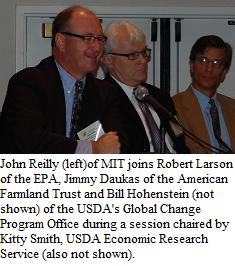Pioneer Hi-Bred International continues to work on increasing agricultural productivity to both feed and fuel the world.
 Pioneer president Paul Schickler spoke on a panel at the World Food Prize symposium in Des Moines Wednesday and one of his points is that biotechnology can “address both the food availability issue as well as making a meaningful impact on our dependence on petroleum based products.”
Pioneer president Paul Schickler spoke on a panel at the World Food Prize symposium in Des Moines Wednesday and one of his points is that biotechnology can “address both the food availability issue as well as making a meaningful impact on our dependence on petroleum based products.”
“We can do that through a number of sciences in the market today and additional generations will be on the market in the years ahead,” Schickler said.
Listen to Schickler biofuels comment here:
[audio:http://www.zimmcomm.biz/world-food/wfp-08-schickler-biofuels.mp3]
You can also download the audio with this link: Paul Schickler on biofuels (mp3)
Schickler also took the first question to the panel, which was “How optimistic are you that the world can reduce hunger by half by 2015?”
Schickler stated that he was very confident that goal could be reached, simply on the basis of increased food production, using hybrid corn as an example. “If you look back throughout the development of hybrid corn, productivity has improved at about one and a half percent per year,” he said. “As we look to the future, we think we can double that, and that has already started to show up in the last 8-10 years through the use of biotechnology, plant genetics and improved agronomic practices.”
Listen to Schickler’s answer to that question here:
[audio:http://www.zimmcomm.biz/world-food/wfp-08-schickler.MP3]
You can also download the audio with this link: Paul Schickler at World Food Prize (mp3)


 Back at it this morning at the Farm Foundation’s Transition to a Bioeconomy: Environmental and Rural Development Impacts Conference in St. Louis, Mo. Today is another big day, as we’re hearing from another variety of speakers who bring a lot of different viewpoints to the table.
Back at it this morning at the Farm Foundation’s Transition to a Bioeconomy: Environmental and Rural Development Impacts Conference in St. Louis, Mo. Today is another big day, as we’re hearing from another variety of speakers who bring a lot of different viewpoints to the table.  two more meetings scheduled for this coming winter and spring (2009) focusing on the global aspects of the bioeconomy and how to get extension offices throughout the nation more involved.
two more meetings scheduled for this coming winter and spring (2009) focusing on the global aspects of the bioeconomy and how to get extension offices throughout the nation more involved. The promise of new science and technology for increasing food and fuel production was part of a conversation panel at the
The promise of new science and technology for increasing food and fuel production was part of a conversation panel at the  Rodrigues says “absolutely we are going to improve new technologies and we are able to feed humankind and produce biofuels all together.” He notes that Brazil is a good example of what can be done in that regard and that there is a “myth” that production of sugarcane for ethanol is reducing the production of food. “This year we have a record grain production, but we also have record sugarcane production, record meat production and record production of dairy products -so there is no competition between sugarcane and food in Brazil and we can apply that in African, other Latin American and Asian countries.”
Rodrigues says “absolutely we are going to improve new technologies and we are able to feed humankind and produce biofuels all together.” He notes that Brazil is a good example of what can be done in that regard and that there is a “myth” that production of sugarcane for ethanol is reducing the production of food. “This year we have a record grain production, but we also have record sugarcane production, record meat production and record production of dairy products -so there is no competition between sugarcane and food in Brazil and we can apply that in African, other Latin American and Asian countries.”
 The amount of water that goes into growing the corn that goes into ethanol has been a big topic of conversation between those for and against production of the green fuel. That’s why it is a topic of conversation at the Farm Foundation’s Transition to a Bioeconomy: Environmental and Rural Impacts Conference in St. Louis this week. This gathering of government officials, academics and industry leaders is designed to take on the tough questions facing Rural America as it moves to a bioeconomy.
The amount of water that goes into growing the corn that goes into ethanol has been a big topic of conversation between those for and against production of the green fuel. That’s why it is a topic of conversation at the Farm Foundation’s Transition to a Bioeconomy: Environmental and Rural Impacts Conference in St. Louis this week. This gathering of government officials, academics and industry leaders is designed to take on the tough questions facing Rural America as it moves to a bioeconomy. The keynote speaker for the symposium kickoff Wednesday was Sir Gordon Conway, who is chief scientific adviser for the UK. He talked about the spike in food prices over the past year and listed at least ten underlying causes, demand for biofuels being only one and he did not single it out as being a major culprit. He also pointed out the increasing global population, higher per capita income, increased demand for meat, higher prices for energy and fertilizer, and a shortage of arable land as some of the other factors.
The keynote speaker for the symposium kickoff Wednesday was Sir Gordon Conway, who is chief scientific adviser for the UK. He talked about the spike in food prices over the past year and listed at least ten underlying causes, demand for biofuels being only one and he did not single it out as being a major culprit. He also pointed out the increasing global population, higher per capita income, increased demand for meat, higher prices for energy and fertilizer, and a shortage of arable land as some of the other factors.

 You don’t have to agree to come up with agreeable solutions… that seems to be the theme for the latest Farm Foundation Transition to a Bioeconomy Conference.
You don’t have to agree to come up with agreeable solutions… that seems to be the theme for the latest Farm Foundation Transition to a Bioeconomy Conference. President of Farm Foundation, Neil Conklin, says bringing together a diverse group of government, academic and industry leaders, who might not agree on everything, is key to the success of these forums.
President of Farm Foundation, Neil Conklin, says bringing together a diverse group of government, academic and industry leaders, who might not agree on everything, is key to the success of these forums. How we develop rural jobs as the country moves to a bioeconomy was the latest subject tackled today at the Farm Foundation’s Transition to a Bioeconomy: Environmental and Rural Impacts Conference in St. Louis.
How we develop rural jobs as the country moves to a bioeconomy was the latest subject tackled today at the Farm Foundation’s Transition to a Bioeconomy: Environmental and Rural Impacts Conference in St. Louis. One of the key speakers during this session was USDA’s Under Secretary for Rural Development Thomas Dorr, who talked about how we need to move forward and be aggressive… even in light of the recent stock market turbulence.
One of the key speakers during this session was USDA’s Under Secretary for Rural Development Thomas Dorr, who talked about how we need to move forward and be aggressive… even in light of the recent stock market turbulence. How do we meet carbon reduction goals?
How do we meet carbon reduction goals? One of the presenters, John Reilly from the Massachusetts Institute of Technology (MIT), says we must be careful we’re not expanding one environmentally-friendly source just to infringe on another area of the environment.
One of the presenters, John Reilly from the Massachusetts Institute of Technology (MIT), says we must be careful we’re not expanding one environmentally-friendly source just to infringe on another area of the environment.